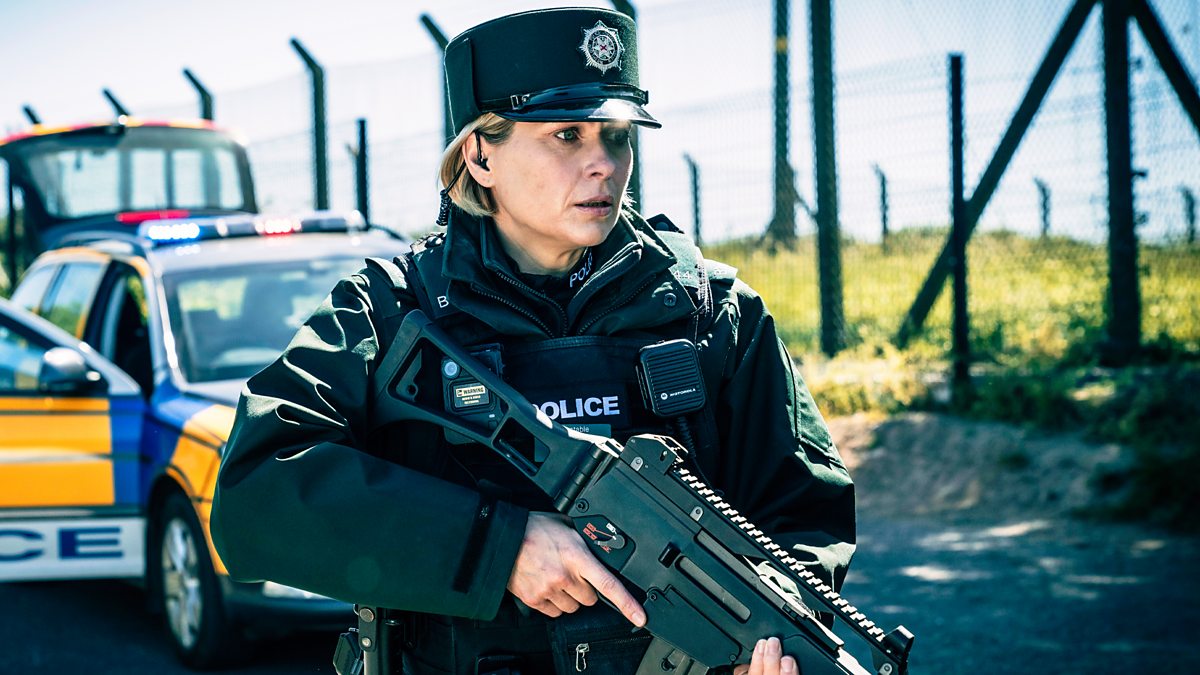If you are wondering whether the BBC’s drama Blue Lights exaggerates the tensions of Northern Ireland, best take it up with the man nailed to the fence.
The critically acclaimed show about fraught Belfast police officers, which has just completed its second series and has had two more commissioned, tells important – and often ugly – truths about life in a place where paramilitaries and associated criminal gangs continue to menace communities.
For many, it’s a relief that the post-Good Friday Agreement reality is finally getting out there. Politicians, business leaders and tourist chiefs, whose default setting is peace process boosterism – how wonderful the place is now – may balk at the gritty on-screen action, but they can’t argue it’s far-fetched. Its storylines could have been culled from the headlines that run day after day in the NI media.
Over May’s first Bank Holiday weekend, the UDA, a loyalist paramilitary organisation, was blamed for a gruesome attack in which a man was nailed to a fence in Bushmills, County Antrim, an area popular with holidaymakers. The victim was taken to hospital still fixed to the fence.
A week before that, it emerged that three UDA men wearing masks, berets and dark glasses mounted a so-called show of strength at the funeral of a former member inside Belfast’s only crematorium, Roselawn.
What did other grieving families waiting to pay their last respects to their own loved ones make of this intimidating spectacle, now being investigated by the Police Service of Northern Ireland (PSNI) and Belfast City Council?
This is the same crematorium that was the centre of a controversy over preferential treatment to mourners at the 2020 funeral of a senior IRA figure during the pandemic. It was an embarrassing episode that led to a council apology and which is now back in the spotlight at the UK Covid-19 inquiry, currently sitting in Belfast.
A sense of lawlessness prevails here. The Firm, one of around 60 criminal gangs in Northern Ireland, shot dead its latest victim in a nationalist estate in Belfast in January this year. It was the 17th murder of its type in the city in 11 years. The PSNI has failed to successfully bring prosecutions for an overwhelming majority of them.
And last year during yet another loyalist feud, masked men, armed with machetes and a firearm, walked through Newtownards, County Down, in broad daylight. The number of loyalist and republican paramilitary “punishment” attacks, where a victim is shot in the knees, elbows or thighs, has tripled in a year.
Most striking of all has been Blue Lights’ depiction of Belfast’s ghetto housing estates, where much of the dark and edgy action unfolds. The peace dividend that saw shiny glass and chrome office blocks and apartments spring up along the city’s waterfront never reached these economically deprived areas.
These are bleak places airbrushed out of the Northern Ireland PLC success story, but now being vividly portrayed in the ratings-winning drama. Series one exposed how nationalist areas remain plagued by dissident republican godfathers. Veteran police officer and viewers’ favourite PC Gerry Cliff – a magnificent performance by Richard Dormer – is shot dead after intercepting a drugs-for-arms deal.
Series two doubled down on that theme, showing some unionist communities still at the mercy of the self-appointed brigadiers of loyalist paramilitaries. Nothing has changed for the people who can’t escape these estates. Terrorists extort protection money with apparent immunity and make a fortune dealing in drugs and loan-sharking.
Tippy-toe policing, which is anxious not to inflame political tensions but runs thugs as informers, means locals live under the same menaces as they did during the Troubles.
When residents in a loyalist estate in Blue Lights sneer at PSNI officers for failing to rid their streets of hardmen, it’s an accurate reflection of the cynicism that’s felt by put-upon real-life citizens. The scripts might seem sensational, but it’s all matter-of-fact in Belfast in 2024.
The very mention of Northern Ireland was for decades a turn-off in Great Britain. However, millions of viewers are now switching on to see a population caught between a violent past and a less-than-ideal present, one that is counter to the politically useful upbeat narrative.
In a year when ITV’s Mr Bates vs the Post Office finally brought the public’s attention to the government’s ineptitude in dealing with the Horizon IT system scandal, Blue Lights highlights another monumental injustice, Westminster’s Legacy Act, which has attracted little attention outside NI.
What might TV audiences, enraged by hundreds of postmasters wrongfully accused of stealing cash, make of a government law that has halted historical victims’ cases and new civil proceedings, and that has retraumatised thousands of grieving victims’ relatives?
Peter Sheridan, head of the newly formed truth recovery body, the Independent Commission for Reconciliation and Information Recovery (ICRIR), admitted that any prospect of a criminal prosecution for offences committed during the Troubles was “vanishingly small”.
With the story of Happy Kelly – a darkly ironic name – the scriptwriters Declan Lawn and Adam Patterson deliver a forensic examination of that trauma. Happy blames himself for the deaths of his father and brother in a 1978 explosion at a chippy – because he had wanted chips for tea.
His need to find out the truth is obvious and – without introducing spoilers – a disturbing tale of informers unfolds, including a former Royal Ulster Constabulary Special Branch officer suffering PTSD and tortured by his moral choices.
There is cause for optimism in Northern Ireland. After a 24-month hiatus, Stormont’s power-sharing Assembly and Executive was restored in January. It is now poised to exploit the benefits of the north’s unique access to both UK and EU markets.
But politics remains febrile. The row between the London and Dublin governments over asylum seekers crossing the border from the UK to Ireland is threatening to reignite Brexit tensions.
The abject failure of politicians to promote any meaningful reconciliation between divided communities has allowed sectarianism to run rife. Arguably, the hated Legacy Act is a direct consequence of that neglect – Westminster says it is aimed at drawing a line under the past. The idea, however, that you can pack away awful things that happened to real people with relatives who still mourn them is morally repugnant.
Peacemaking has turned out to be a series of queasy compromises. Violence is downplayed in the interests of “progress”. The instinct is to avoid mentioning the past because awkward questions could threaten the political institutions. Dysfunction seems to be the price of stability.
The PSNI’s failure to attract more recruits from a nationalist/Catholic background is further proof of how slow real change is. The force’s predecessor, the RUC, which had 300 officers murdered, was 93% Protestant.
Despite a 50/50 recruitment policy until 2011, Catholics only make up 31.7% of PSNI officers – more specifically, Catholic officers born in Northern Ireland account for only 26.4%.
But it seems the excitement of the all-action world of Blue Lights may be changing attitudes to the PSNI – and in Northern Ireland it’s impossible to overstate the importance of seeing police officers as human beings, not targets. The show makes clear that joining the PSNI puts your life at risk, no matter your background.
In the real world, a detective chief inspector was critically injured in a shooting in front of his young son in Omagh in February 2023.
Officers are armed, conceal what they do for a living and check under their cars for bombs – just as they did during the Troubles.
And the risks are particularly acute for officers from a nationalist/Catholic background. Fear of being singled out for murder by dissident republicans or ostracised by elements of their own community still hostile to what they perceive as Crown forces has deterred potential recruits. A Catholic officer was murdered by a car bomb outside his home in 2011. The previous year another lost a leg, again in a car bomb.
Blue Lights hasn’t shied away from portraying these dangers. Rookie cop Annie Conlon (the excellent Katherine Devlin) plays camogie, a Gaelic sport for women, and worries about her teammates finding out what she does for a living. A dissident republican threat forces her to move house.
Martin McCann, who plays officer Stevie Neil, has spoken about how the series is shifting perceptions. McCann, from a working-class nationalist area, said: “For the first time people in the likes of West Belfast are being introduced and not in a propaganda way [to] what a police officer is.
“A few of my friends have said to me that they loved the show and they hated the show – they loved the show because it was great and they hated the fact that it made them love cops.”
If only Blue Lights could also transform the tarnished image of the actual PSNI, where rank-and-file morale is at rock bottom after a series of scandals that led to the resignation of ex-chief constable Simon Byrne.
They include a court ruling that two officers were unlawfully disciplined to appease Sinn Féin, and a catastrophic data breach in which the personal details of 9,500 officers and civilian staff ended up in the hands of dissident republicans. Around 5,000 employees are taking legal action, with security and compensation payments likely to run to £240m.
In another incident, a senior officer lost a laptop and a notebook containing the details of 42 officers and staff after leaving them on the roof of his car and driving off.
The real-life dramas keep on coming, but that scene might just stretch TV viewers’ credulity a bit too far.
Gail Walker is a former editor of the Belfast Telegraph




